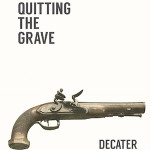We Can Do Better
Research and development at the Chaos Factory has slowed to a crawl ever since our $23m budget was appropriated to produce the Doctor’s promotional Kickstarter video. So, unexpectedly finding myself with time on my hands, I decided to read the front page of my website for the first time in a number of months. To my horror (but perhaps not surprise), I discovered that the responsible and principled culture I founded the Chaos Factory to reflect has been utterly perverted. Again. Most recently with a facile homily on aphorisms.
Before funding was cut, our widely publicized research conclusively showed that aphorisms, and all other species of truisms and platitudes, have quietly been undermining civil progress for years. To begin with, the corpus of English aphorisms is a knotty tangle of contradiction. For every modish insight that slips from the side of Wilde’s mouth, or lines of avuncular reassurance printed below Albert Einstein’s raspberry, there is a counter, deftly composed by an equally clever author, which states the exact opposite thing. The quotes from the Doctor’s article serve as examples. If Mark Twain says that “grief can take care of itself”, where is misery going to go for company? And, while Anne Frank prefers not to dwell on the misery of the holocaust, Elie Wiesel writes contrary that, “for the dead and the living, we must bear witness.” Is he wrong? Is she? It isn’t the type of question that can be answered by matching maxims against each other. Nor is anything necessarily resolved by applying them experimentally to the realities of life, as that still might not indicate how broadly or consistently an aphorism is of use, if it is of any use at all. Because of this, aphorisms can be very misleading, and some seem quite evidently dangerous. Is “don’t give up on what you want” the best encouragement to give a psychotic cannibal? How about the one in four teenage girls out of a thousand polled who fully expect to become a famous TV/movie personality? And few people, let alone Scotsmen, can hear “every man dies, but not every man truly lives” without a little patriotic hiccup, but if I were composing a list of quotes on how to live, Mel Gibson’s advice to die violently would not be on it. Aphorisms can be beautiful. But, if they evoke feelings of truth, it is only because they are beautiful. It is not because they are accurate. At best, they only ever describe an aspect or a facet of the reality. From the right angle, they may glint alright, but is that glinting light illumination enough to guide our lives?
 It is understandable that these quick-hit memes nest comfortably in our minds, being short, funny, or evoking an easily visualized situation. But surely the wiser heads among us anticipate the severe limitations and shortcomings of aphorisms, and know better than to place too much confidence in them? Of course not. These half-truths and folksy quips are seemingly what comprise the very foundation and essence of our common knowledge and social morality. From the Psalms to the Sutras to the inspirational taglines from Hollywood blockbusters – the wisdom behind our nebulous sense of how to best make our way through life is no more than a compendium of sophistry and right-once-a-day poetry. In our most trying times, when faced with our toughest decisions, the human race daily turns to sayings with the complexity of song lyrics for absolute truth – knowing that if we “remain true to ourselves” or “don’t put all our eggs in one basket”, we shall be delivered. This is idiocy, and we can do better. Here at the Chaos Factory, we want to remind you that there are alternatives.
It is understandable that these quick-hit memes nest comfortably in our minds, being short, funny, or evoking an easily visualized situation. But surely the wiser heads among us anticipate the severe limitations and shortcomings of aphorisms, and know better than to place too much confidence in them? Of course not. These half-truths and folksy quips are seemingly what comprise the very foundation and essence of our common knowledge and social morality. From the Psalms to the Sutras to the inspirational taglines from Hollywood blockbusters – the wisdom behind our nebulous sense of how to best make our way through life is no more than a compendium of sophistry and right-once-a-day poetry. In our most trying times, when faced with our toughest decisions, the human race daily turns to sayings with the complexity of song lyrics for absolute truth – knowing that if we “remain true to ourselves” or “don’t put all our eggs in one basket”, we shall be delivered. This is idiocy, and we can do better. Here at the Chaos Factory, we want to remind you that there are alternatives.
 Check out Decater's new novel, available now at Amazon. Plus, don't forget his earlier books: Ahab's Adventures in Wonderland and Picasso Painted Dinosaurs.
Check out Decater's new novel, available now at Amazon. Plus, don't forget his earlier books: Ahab's Adventures in Wonderland and Picasso Painted Dinosaurs.


